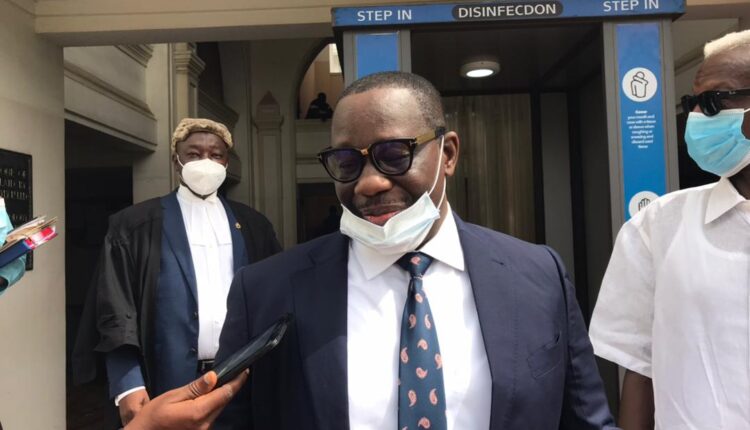State files new charges against former SSNIT boss and four others
State prosecution has filed fresh charges against former SSNIT boss Ernest Thompson and four others for causing financial loss.
Mr Thompson, John Hagan Mensah, Juliet Hassana Kramer, Caleb Kwaku Afaglo and Peter Hayibor, are to respond to their various roles in the SSNIT Operational Business Suite (OBS) project.
The fresh charges follows a Supreme Court ruling directing state prosecution to amend the charges as the team did not have sufficient particulars to support the previous charges.
Principal State Attorney, Richard Gyimbibi on Thursday, April 22, told the Accra High Court that the amended charge sheets were filed on April 20, 2021.
The 10 counts amended with further particulars relate to willfully causing financial loss to the state.
The former SSNIT boss, John Hagan Mensah, Juliet Hassana Kramer, and Peter Hayibor, have been charged with willfully causing financial loss to the state to the tune of $14.8 million.
While, Caleb Kwaku Afaglo, is facing charges relating to forged documents and possession of forged documents.
Lawyers of the accused persons informed the court they are yet to be served with the new charge sheet.
The presiding judge, Justice Henry Anthony Kwofie adjourned the case to May 20, 2021. The accused persons are expected to enter their plea on the next adjourned date, where the charges will be read to them.
Supreme Court’s ruling
On Wednesday, March 17, 2021, the apex court dismissed an appeal against the accused persons.
In a unanimous decision, the five-member panel presided by Yaw Appau said, “the appeal does not meet the constitutional requirement, and we find no merit for the appeal and it is hereby dismissed.”
The appeal application was brought before the apex court by the state prosecution.
The application was to make a ruling on a court of appeal decision for state prosecution to amend its charge sheet against the former SSNIT boss.
The former SSNIT boss wanted charges against him struck out on the basis that the prosecution failed to provide adequate particulars of the offences as required by law.
It was the case of Mr Thompson that the prosecution failed to provide sufficient particulars on the offences levelled against him as required under Article 19 (2) of the 1992 Constitution and Section 122 of the Criminal Offences (Procedure) Act, 1960 (Act 30).
His lawyers argued that the particulars were so scanty that they did not afford their client any concrete information to enable him to mount his defence.
On the other hand, the prosecution insisted that the particulars of the offences contain adequate information, and argues that the contention of Mr Thompson, when allowed to hold, will amount to the prosecution providing evidence in the particulars of the offence.
But the apex court on Wednesday, March 17, upheld the decision of the appeal court.
It said the charges preferred against the accused persons indeed did not meet the constitutional requirements.
Other panel members included Justices Agnes M.A. Dordzie, Avril Lovelace-Johnson, Gertrude Torkonoo and Issifu Omoro Tanko Amadu.
The genesis of the problem
In June 2010, SSNIT initiated the $34 million OBS project to use Information and Communications Technology (ICT) to revamp its operations to provide a state-of-the-art pension administration system.
Per the facts, between September 2013 and September 2016 the five accused persons engaged in various illegalities that caused financial loss to the state in relation to the said project.
The contract sum, the prosecution said, also ballooned from $34 million to over $66 million, even though the OBS system failed to perform efficiently as the project contract had envisaged.


